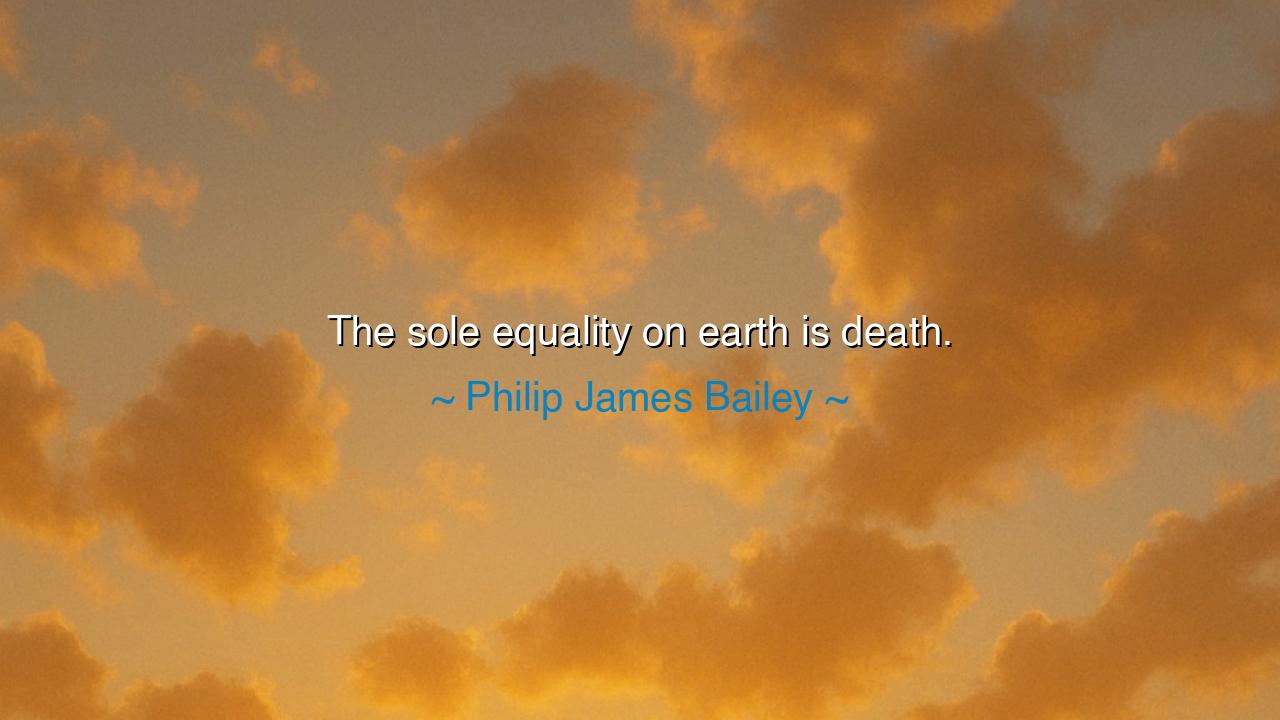
The sole equality on earth is death.






In the councils of elder voices, hear Philip James Bailey pronounce a flint-bright verdict: “The sole equality on earth is death.” The line lands like a bell at dusk—plain, resonant, undeniable. It names the paradox of our days: though wealth and rank, beauty and learning divide us in life, there is one appointment that gathers every name into a single ledger. The sentence does not gloat; it clarifies. It strips away the ornaments by which we measure ourselves and leaves the common measure that cannot be bought or bartered: death.
The meaning is twofold. First, the claim is a rebuke to pride. If the road ends at the same gate for emperor and laborer, then the crown is lighter than it looks and the burden nobler than it seems. Second, the claim is a comfort to the humbly placed. If all must pass through the same door, then no life is beneath regard, no grief beneath respect, no kindness wasted. The saying turns our eyes from status to substance, from the size of our estates to the weight of our deeds. Equality at the end should awaken equity along the way.
The origin of the line is Bailey’s sprawling Victorian epic Festus (first published 1839), a Faust-like poem that stages a debate over time, justice, and immortality. In a passage voiced by Lucifer, the poem hurls a cold truth at human pretensions: “The sole equality on earth is death; / Now, rich and poor are both dissatisfied,” and then presses toward judgment as the ultimate leveling. The line appears verbatim in 19th-century printings and modern scans of Festus, where its context is explicitly social—rich and poor alike discontent beneath a sky that will one day render all accounts plain.
Bailey himself—now remembered chiefly for Festus—stood at a crossroads of Romantic fire and Victorian conscience. His poem, widely read in its time, sought nothing less than a theodicy in verse: God, man, and destiny argued at epic scale. In that setting, the aphorism is not a mere proverb but a hinge in the poem’s logic: if death levels, then earthly hierarchies are provisional; if hierarchies are provisional, then justice must be sought beyond them or enacted within them while time remains.
A story will make the wisdom plain. In a small city, two funerals met at the same hour: one for a magnate whose name crowned buildings, one for a nurse whose name crowned no marquee. The same wind moved the black coats. The same hymn shook two chapels. At both altars, children spoke not of titles but of tenderness: a hand on a shoulder, a bedtime story told weary, a quiet debt forgiven. Those who left the magnate’s hall felt suddenly shy of their talk of shares; those who left the nurse’s felt suddenly rich. Bailey’s line had walked the aisle—equality at the end revealing what truly counts before it.
History gives a sterner witness. When plague swept medieval streets, lords and tenants learned a common language of bells. When wars ended, even victors wept over the equality of graves—names different, silence the same. Such seasons, brutal tutors, have repeatedly returned peoples to the ancient arithmetic: if death makes us peers, wisdom bids us practice a kind of equality in life—mercy in our judgments, fairness in our dealings, dignity in our policies.
From this recognition flow clear practices. Keep short accounts—apologize quickly, forgive freely—because the clock does not bargain. Order your house—papers, bequests, blessings—so your love remains useful when your voice is quiet. Spend your strength where it lightens another’s load; measure your days not by trophies raised but by consolations given. Let mortality discipline your priorities: fewer vanities, more visits; fewer boasts, more bread shared.
Carry the cadence as a pocket rule: sole, equality, earth, death. Let it humble your pride and embolden your compassion. For if the last threshold makes us equal, the noble life is the one that lives as though that truth were already so—honoring the lowly, restraining the mighty, and counting each moment precious because it is passing. Bailey’s old sentence turns our gaze from the glitter to the good: live now in the justice the end will teach.






AAdministratorAdministrator
Welcome, honored guests. Please leave a comment, we will respond soon